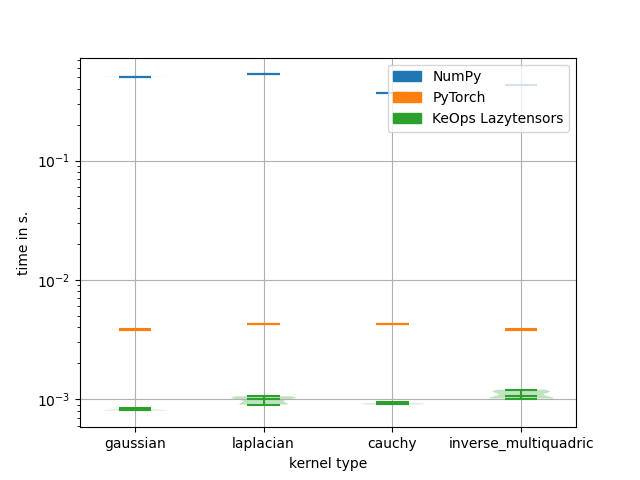Note
Go to the end to download the full example code
Radial kernels convolutions
This benchmark compares the performances of KeOps versus Numpy and PyTorch on various radial kernels convolutions. Namely it computes:
\[\begin{split}a_i = \sum_{j=1}^N f\Big(\\frac{\|x_i-y_j\|}{\sigma}\Big) b_j, \quad \\text{ for all } i=1,\cdots,M\end{split}\]
where \(f\) is a Gauss or Cauchy or Laplace or inverse multiquadric kernel. See e.g. wikipedia
Setup
Standard imports:
import numpy as np
import timeit
import matplotlib
from matplotlib import pyplot as plt
from pykeops.numpy.utils import np_kernel
from pykeops.torch.utils import torch_kernel
from pykeops.torch import Vi, Vj, Pm
Benchmark specifications:
M = 10000 # Number of points x_i
N = 10000 # Number of points y_j
D = 3 # Dimension of the x_i's and y_j's
E = 3 # Dimension of the b_j's
REPEAT = 10 # Number of loops per test
dtype = "float32"
Create some random input data:
x = np.random.randn(M, D).astype(dtype) # Target points
y = np.random.randn(N, D).astype(dtype) # Source points
b = np.random.randn(N, E).astype(dtype) # Source signal
sigma = np.array([2.4]).astype(dtype) # Kernel radius
And load it as PyTorch variables:
try:
import torch
use_cuda = torch.cuda.is_available()
device = "cuda" if use_cuda else "cpu"
torchtype = torch.float32 if dtype == "float32" else torch.float64
xc = torch.tensor(x, dtype=torchtype, device=device)
yc = torch.tensor(y, dtype=torchtype, device=device)
bc = torch.tensor(b, dtype=torchtype, device=device)
sigmac = torch.tensor(sigma, dtype=torchtype, device=device)
except:
pass
Convolution Benchmarks
We loop over four different kernels:
kernel_to_test = ["gaussian", "laplacian", "cauchy", "inverse_multiquadric"]
kernels = {
"gaussian": lambda xc, yc, sigmac: (
-Pm(1 / sigmac**2) * Vi(xc).sqdist(Vj(yc))
).exp(),
"laplacian": lambda xc, yc, sigmac: (
-(Pm(1 / sigmac**2) * Vi(xc).sqdist(Vj(yc))).sqrt()
).exp(),
"cauchy": lambda xc, yc, sigmac: (
1 + Pm(1 / sigmac**2) * Vi(xc).sqdist(Vj(yc))
).power(-1),
"inverse_multiquadric": lambda xc, yc, sigmac: (
1 + Pm(1 / sigmac**2) * Vi(xc).sqdist(Vj(yc))
)
.sqrt()
.power(-1),
}
With four backends: Numpy, vanilla PyTorch, Generic KeOps reductions and a specific, handmade legacy CUDA code for kernel convolutions:
speed_numpy = {i: np.nan for i in kernel_to_test}
speed_pytorch = {i: np.nan for i in kernel_to_test}
speed_pykeops = {i: np.nan for i in kernel_to_test}
print("Timings for {}x{} convolutions:".format(M, N))
for k in kernel_to_test:
print("kernel: " + k)
# Pure numpy
g_numpy = np.matmul(np_kernel(x, y, sigma, kernel=k), b)
speed_numpy[k] = timeit.repeat(
"gnumpy = np.matmul( np_kernel(x, y, sigma, kernel=k), b)",
globals=globals(),
repeat=5,
number=1,
)
print("Time for NumPy: {:.4f}s".format(np.median(speed_numpy[k])))
# Vanilla pytorch (with cuda if available, and cpu otherwise)
try:
g_pytorch = torch_kernel(xc, yc, sigmac, kernel=k) @ bc
torch.cuda.synchronize()
speed_pytorch[k] = (
np.array(
timeit.repeat(
"torch_kernel(xc, yc, sigmac, kernel=k) @ bc; torch.cuda.synchronize()",
globals=globals(),
repeat=REPEAT,
number=4,
)
)
/ 4
)
print(
"Time for PyTorch: {:.4f}s".format(np.median(speed_pytorch[k])),
end="",
)
print(
" (absolute error: ",
np.max(np.abs(g_pytorch.cpu().numpy() - g_numpy)),
")",
)
except:
print("Time for PyTorch: Not Done")
# Keops: LazyTensors implementation (with cuda if available)
try:
g_pykeops = (kernels[k](xc, yc, sigmac) @ bc).cpu()
torch.cuda.synchronize()
speed_pykeops[k] = (
np.array(
timeit.repeat(
"kernels[k](xc, yc, sigmac) @ bc; torch.cuda.synchronize()",
globals=globals(),
repeat=REPEAT,
number=4,
)
)
/ 4
)
print(
"Time for KeOps LazyTensors: {:.4f}s".format(
np.median(speed_pykeops[k])
),
end="",
)
print(
" (absolute error: ",
np.max(np.abs(g_pykeops.data.numpy() - g_numpy)),
")",
)
except:
print("Time for KeOps LazyTensors: Not Done")
Timings for 10000x10000 convolutions:
kernel: gaussian
Time for NumPy: 0.5028s
Time for PyTorch: 0.0068s (absolute error: 0.00013780594 )
Time for KeOps LazyTensors: 0.0007s (absolute error: 8.9645386e-05 )
kernel: laplacian
Time for NumPy: 0.5251s
Time for PyTorch: 0.0077s (absolute error: 0.00012874603 )
Time for KeOps LazyTensors: 0.0007s (absolute error: 8.583069e-05 )
kernel: cauchy
Time for NumPy: 0.4667s
Time for PyTorch: 0.0077s (absolute error: 0.00017929077 )
Time for KeOps LazyTensors: 0.0007s (absolute error: 0.0001077652 )
kernel: inverse_multiquadric
Time for NumPy: 0.5421s
Time for PyTorch: 0.0068s (absolute error: 0.00020599365 )
Time for KeOps LazyTensors: 0.0008s (absolute error: 0.00014686584 )
Display results
# plot violin plot
plt.violinplot(
list(speed_numpy.values()),
showmeans=False,
showmedians=True,
)
plt.violinplot(
list(speed_pytorch.values()),
showmeans=False,
showmedians=True,
)
plt.violinplot(
list(speed_pykeops.values()),
showmeans=False,
showmedians=True,
)
plt.xticks([1, 2, 3, 4], kernel_to_test)
plt.yscale("log")
# plt.ylim((0, .01))
plt.grid(True)
plt.xlabel("kernel type")
plt.ylabel("time in s.")
cmap = plt.get_cmap("tab10")
fake_handles = [matplotlib.patches.Patch(color=cmap(i)) for i in range(4)]
plt.legend(
fake_handles,
["NumPy", "PyTorch", "KeOps Lazytensors"],
loc="best",
)
plt.show()

Total running time of the script: (0 minutes 13.738 seconds)